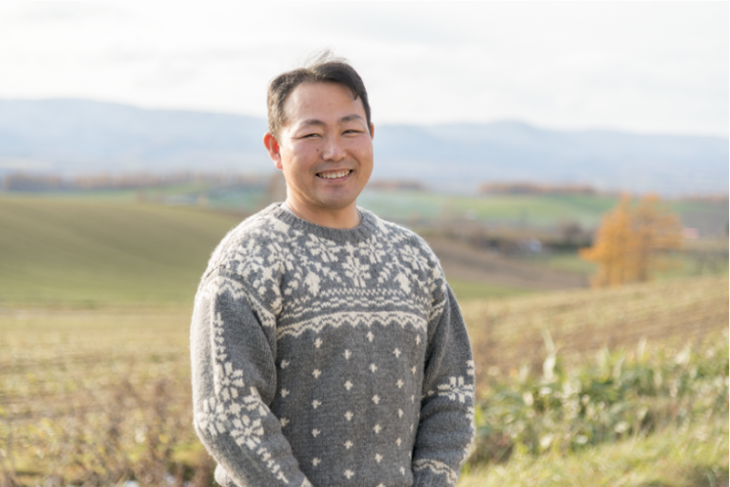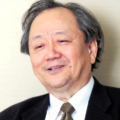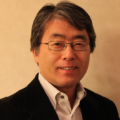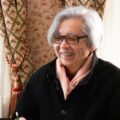Treasuring This Current Moment with My Family — TAKEKAWA Yoichi, Toy Importer
Toy Store of the Biei Hills stands facing a vast Hokkaido field that is among Japan’s most beautiful scenery is where the. This store is only open until 3 p.m., at which time it turns into a playground open to the local children. This is because Takekawa Yoichi, who moved here in 2010 from Saitama Prefecture, aims not to make money but rather to develop family time amid Mother Nature.
The four years it took to get this started were not easy. “When you read stories of people who moved to Hokkaido, you get the impression that they all made the transition so smoothly,” Takekawa reflects. “I’ve often wondered why we had to have it so tough.”

In front of his home is the Biei wheat field, a characteristic view of Hokkaido.
Photo: KAWAMURA Isao
It all began with the death of his father, who hand-built the current toy store building. His father was running a think tank in Yokohama, but when his wife suddenly died of a heart attack, he fell into the depths of despair. After a while, he suddenly decided to move to Hokkaido. But a contractor ran off with his money to build the new home. Still he procured wood on his own, and with the help of the local people he hand-built the log-house that stands there today, and opened a museum. It took him whole two years and as if the hardship of this had all bore down on him, he died of lung disease eight years ago.
Takekawa, having lost his mother when she was 57 and father at 63, took it upon himself to ask, “What is it that I really want to do?” After a great deal of thought, the answer he came to was to live amid Mother Nature, with the family helping each other out. His dream was a life like on the television show Little House on the Prairie, which he experienced firsthand in high school when he stayed on a farm in the U.S. state of Minnesota. He decided he would use the house left by his father. He would take the lonely house his father had lived in alone and fill it with laughter.
Takekawa turned in his resignation at the imported toy distributor he had worked for, but the real trouble came from that point on. To more to Hokkaido was not an easy decision for his wife, Junko, who had a stable job in Tokyo as an elementary school teacher. Much concern also came from his parents in law. How will you make a living in an environment snowed in during the winter? What will you do with the two children’s education? The issues his in-laws raised were exactly what he had had in mind himself.
So he reached the decision to start an online toy sales, and launched an Internet toy store while still in Saitama. The goods it handled were carefully made, reliable toys from Europe and Japan. But sales barely reached a level capable of feeding his family. “Definitely next year,” he kept telling himself for three years, but the unclear prospects scarcely changed. All that time, the children he wanted to raise in Mother Nature were steadily growing up.
The couple finally decided to move in time for their daughter to start fourth grade and son to enter elementary school. They were not fully prepared but they thought they simply had to do it. However, the Lehman Brothers collapse in the fall of 2008 brought grim economic prospects, which forced them to postpone their move for a full year. After confirming throughout that time that sales would not drop significantly, the family moved to Biei the following spring. “We spent Christmas before the move at this house and told our kids that we’d be moving. Our fourth-grade daughter didn’t want to leave her friends, and she cried.” Tears well in Takekawa’s eyes as he recalls the time.
“I made my children sad, and pulled my wife away from her long-time workplace. That’s why my mission here is to make everyone happy. My job is to make everyone feel it was worth coming here.”
Winter in Hokkaido is tough. To heat the house with a wood-burning stove, they need to prepare a vast amount of lumber during the summer. They would need to cut trees from the hills behind the house, receive some from neighboring farms, and the entire family had to chop wood. It was not easy, but that’s exactly what leads to achieving Takekawa’s ideal life of a family cooperating with each other. Fortunately, Junko landed a teaching job at the local public elementary school a week after they arrived, which gave their life a financial foundation. Today, the children have completely adapted to the northern life.

Takekawa’s toy store, which is open to the local children after school, has hosted Mori no oasobikai (Forest playtime) once a month for the past two years. From his wish to near his goal of filling his father’s house with laughter and out of his appreciation to the community, Takekawa offers the children opportunities to physically play outdoors and learn to let themselves fully enjoy their time just being kids.
While the toy store business did not incur the impact of the Lehman collapse, it still has not recovered from the effects of sales that halved after the Great East Japan Earthquake. “If we start lacking the money to live, I’d do part-time work or whatever I need to. I want to experience and overcome both happiness and suffering with the combined efforts of my family. That’s what I came here for.” Takekawa analyzes himself and sees that there are two conflicting thoughts inside him. “After experiencing my parents’ premature deaths and seeing the way may father lived, I have in myself both the positive mentality that says ‘I can do it if I try’ and the negative mentality that says, ‘‘Who knows if there’s a tomorrow?’ I think that the two combined is my driving force to realizing my dream. When we are much older and our kids grow up, I don’t know how our life here will change; we have no way of knowing the future. But I want to treasure this very moment with my family.”
As he says this, Takekawa’s presence seemed to mirror that of Charles Ingalls, the family father in Little House on the Prairie.
Translated from “Ima Kono Shunkan no Kazoku no Jikan wo Taisetsuni (Treasuring This Current Moment with My Family),’’ Kangaeruhito, Winter 2014, pp. 52-53. (Courtesy of Shinchosha Publishing) [December 2013]




